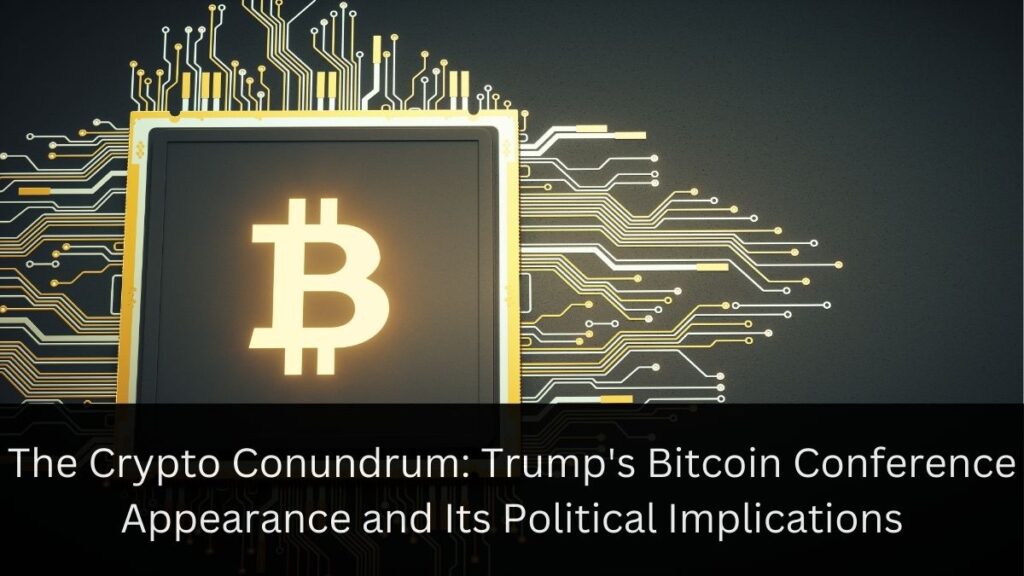In the ever-evolving landscape of American politics, unexpected alliances and strategic pivots are par for the course. Yet, few could have predicted the latest development in the 2024 presidential race: former President Donald Trump’s scheduled appearance at a Bitcoin conference in Nashville. This event, set against the backdrop of a failed assassination attempt, marks a pivotal moment not just for Trump’s campaign, but for the cryptocurrency industry as a whole.
A Surprising Turnaround
Trump’s relationship with cryptocurrency has been, to put it mildly, complicated. In 2019, he tweeted his disdain for Bitcoin and other cryptocurrencies, dismissing them as volatile, unregulated, and facilitators of illegal activity. Fast forward to 2024, and we find a dramatically different narrative. The former president is not only speaking at a Bitcoin conference but seemingly embracing crypto as part of his campaign strategy.
This shift is more than just a personal change of heart; it represents a broader political calculation. The Republican Party has been positioning itself as the pro-crypto party, with various members making preemptive anti-CBDC declarations and voting efforts to support crypto-friendly legislation. Trump’s appearance at the conference is a clear signal that the GOP sees potential in courting the crypto vote.
The Numbers Game
At first glance, the crypto demographic might seem too niche to warrant such attention from a presidential campaign. According to the Federal Reserve, only 7% of American adults used or held crypto in 2023. However, other sources paint a more significant picture:
- Paradigm, a crypto investment firm, suggests that 28% of Republicans hold or have bought crypto.
- Coinbase, a major crypto exchange, claims that 52 million Americans own cryptocurrency.
These numbers, while varying, indicate a potentially influential voting bloc. In a tight race, even a small percentage of dedicated voters could tip the scales in crucial battleground states.
Beyond the Numbers: The Symbolic Significance
Trump’s decision to speak at the Bitcoin conference in Nashville transcends mere vote-counting. Tennessee is a reliably Republican state, which makes this appearance more about the message than the location. By choosing to address a crypto-focused audience, Trump is elevating the status of cryptocurrency in the national political discourse.
This move signals that crypto is no longer a fringe interest but a legitimate campaign issue. It’s being treated with the same gravity as traditional campaign stops at factories or union halls. The content of the conference, rather than its geographical location, is what matters here.
The Single-Issue Voter Phenomenon
Political strategists often target “single-issue voters” – those who base their voting decision primarily on one specific policy area. While it’s unlikely that all crypto holders are single-issue voters, even a small percentage could be significant. As Ryan Selkis, founder of crypto research firm Messari, pointed out in an interview with CoinDesk, a presidential election could be decided by as few as 100,000 votes in key battleground states.
In this context, Trump’s crypto pivot makes strategic sense. By appealing to crypto enthusiasts, he’s not just chasing votes but also potentially influencing a network of voters who might sway others in their circle.
The Fundraising Factor
It’s worth noting that this isn’t just about votes. A Trump fundraiser at the event reportedly costs over $800,000 per seat. This astronomical figure underscores another aspect of the crypto world’s political relevance: its financial clout. The intersection of wealth and political influence in the crypto space adds another layer of complexity to this evolving narrative.
A Broader Shift in Political Discourse
Trump’s appearance at the Bitcoin conference is part of a larger trend of cryptocurrency becoming integrated into mainstream political discourse. The GOP has even added crypto to its official platform marketing materials, listing it under “Champion Innovation” alongside topics like artificial intelligence and space exploration.
This mainstreaming of crypto in politics reflects a growing recognition of its importance not just as a financial tool, but as a symbol of innovation, individual freedom, and resistance to centralized control – themes that resonate strongly with many conservative voters.
The Road Ahead: Implications and Speculations
As we look towards the 2024 election, several questions emerge:
- How will the Democratic Party respond to this GOP embrace of crypto?
- Will other candidates follow Trump’s lead in courting the crypto vote?
- Could crypto policy become a more prominent issue in debates and campaign platforms?
The answers to these questions could shape not just the future of cryptocurrency in America, but also influence broader discussions about financial regulation, technology policy, and individual liberty.
Trump’s scheduled appearance at the Bitcoin conference, despite recent challenges, marks a significant moment in both political and crypto history. It represents the convergence of traditional politics with a technology that was, not long ago, considered fringe at best.
As we watch this story unfold, it’s clear that the landscape of political campaigning is evolving. Cryptocurrency, once a niche interest, is now a talking point on the campaign trail. Whether this is a fleeting moment or the beginning of a new era in political discourse remains to be seen.
One thing is certain: the intersection of politics and cryptocurrency is no longer theoretical. It’s happening now, and it’s likely to influence not just this election cycle, but the future of finance and governance in America.
As voters and citizens, it’s crucial that we stay informed and engaged. Whether you’re a crypto enthusiast or a political junkie, these developments affect us all. The fusion of cutting-edge technology and age-old political strategy is creating a new paradigm – one that we’ll all need to navigate in the years to come.

